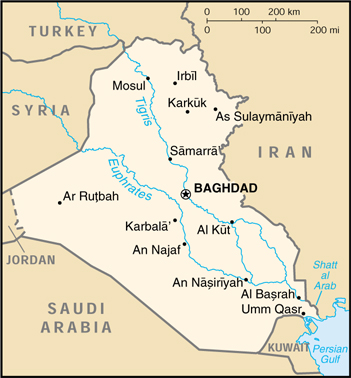

Status Quo Side: Kuwait
Non-Status Quo Side: Iraq
Region: Middle East
Conflict Type: Interstate
Issues in Dispute: Resources Territory
The 1899 British-Kuwait agreement on British rule ended by mutual consent with Britain agreeing to provide aid on request. The reactions of other states were equivocal as oil-rich Kuwait's economic and political ties to Britain appeared unchanged. After Kuwait gained its independence on June 19 1961 President Abdul Karim Kassem of Iraq asserted a long-standing Iraqi claim to Kuwait on June 25.
Emir Abdallah al-Salim Al Sabah declared a state of emergency and alerted his army. Despite indications that Iraq would pursue its claim peacefully, rumors of troop movements prompted the Sheikh to seek British military aid. British forces built up rapidly. In the UNSC (where the majority approach was vetoed) and then in the Arab League, the problem was seen as one of seeking British withdrawal rather than of Iraqi threats, now generally discounted. Failing Iraqi recognition, the Sheikh demanded and received an Arab protective force despite an Iraqi threat to withdraw from the League. By October 1961 a token Arab force had replaced the British, and the Sheikh had offered a percentage of oil royalties for Arab development. The threat of renewed British intervention remained during subsequent tensions on the issue.
Although Iraq did not withdraw its claim, the new Baathist regime agreed to exchange ambassadors, and Kuwait was admitted to the UN.
On August 2 1990 Iraq under Saddam Hussein, declining mediation with Kuwait over contested oil fields on their joint border, invaded Kuwait and claimed it as Iraq's 19th province. The UNSC approved sanctions and on November 29 authorized member states to use "all necessary means" to achieve Iraqi withdrawal by January 15 1991. On February 24 a US-led coalition launched a massive ground assault against Iraqi forces. Four days later Iraq announced its readiness to accept all UNSC demands. The UN weapons inspection process was contentious, with charges of Iraqi concealment of stockpiles of biological weapons generating crises some of which involved the use of primarily US force. Allied support for enforcement dwindled, but Iraqi cooperation improved after direct intervention in a 1997 crisis by UNSYG Kofi Annan. In June, 1998 UN chief weapons inspector Richard Butler sounded optimistic that sanctions could soon be lifted, permitting normal Iraqi oil exports, but relations subsequently deteriorated. UN weapons inspectors were forced out in 1999.